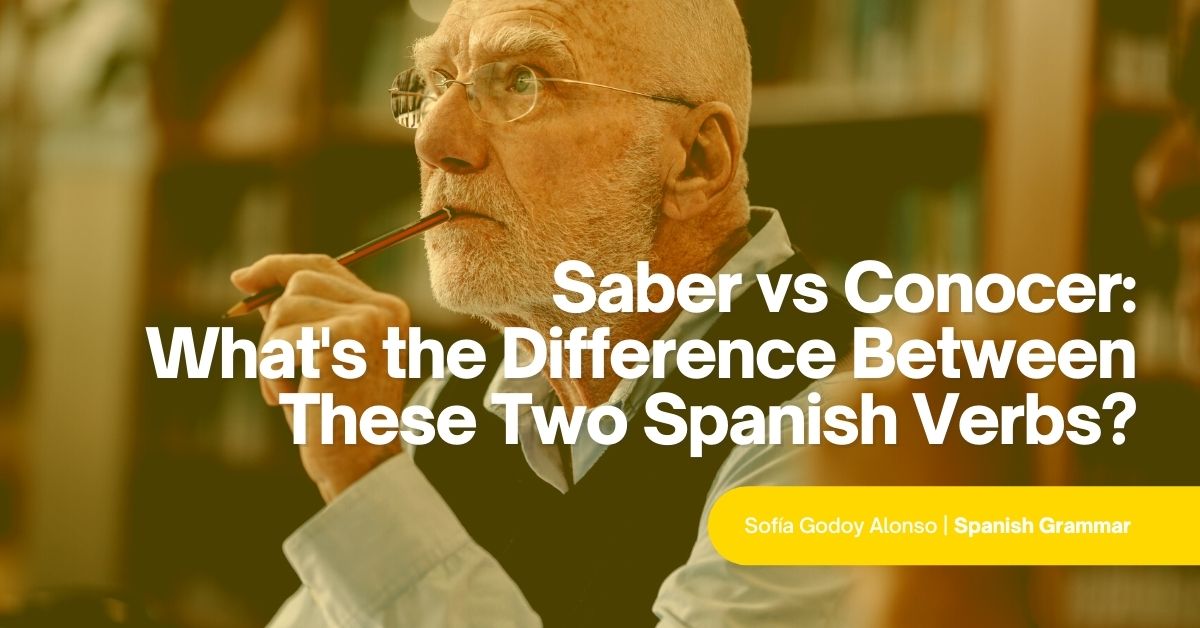
Saber vs Conocer: What’s the Difference Between These Two Spanish Verbs?
Choosing between saber vs conocer can be tricky for Spanish learners. The verbs have meanings that are similar and are often confused, even by native speakers!
There’s differences that make the choice between saber vs conocer simpler. Such differences are key for clarifying how the verbs vary in meaning.
If you’re questioning yourself about saber vs conocer, keep in mind that they are not interchangeable. They are both closely related to expressing knowledge and mastering their use is essential for fluent Spanish speakers.
Let’s discover how you can dominate the dilemma of saber vs conocer.
The Meaning of Saber
The verb saber means “to know”. You can use it to express your knowledge of a fact, a specific situation, or a specific ability you’ve learned and mastered.
Here are a few example sentences and further explaining for each meaning of saber.
Using Saber To Express Knowledge
The verb saber is used in this context to express that you or another subject knows a specific fact, a situation, or information. In the negative form it’s used to express ignorance.
When used in this context, the verb saber is followed by a preposition such as: qué (what), por qué (why), quien (who), dónde (where), or cuál (which).
Example Sentences
¿Sabes si el sábado fue la boda de Lucía?
Do you know if Lucia’s wedding was saturday?
¿Tu mamá sabe que hiciste trampa en el examen?
Does your mom know you cheated on the test?
Ella sabe dónde dejaste las llaves.
She knows where you left the keys.
¿Sabías que Miguel ya es papá?
Did you know Miguel is already a father?

¿Cristina sabe cuándo viene el jardinero?
Does Cristina know when the gardener comes?
Yo no sabía que vives cerca de mí.
I didn’t know you live near me.
Using Saber To Express Ability
Saber is used in this specific scenario to express your experience in completing a certain task or specific ability. You use it to explain you know how to do something. In the negative form it’s used to express lack of expertise.
In order to build such sentences you use saber + verb in infinitive or the field of expertise.
Example Sentences
¿Sabes hacer galletas?
Do you know how to make cookies?

Yo sé hablar español.
I know how to speak Spanish.
Andrés sabe tocar la guitarra.
Andres knows how to play guitar.
¿Tu hermano sabe usar el telescopio?
Does your brother know how to use the telescope?
Ana sabe hacer macramé.
Ana knows how to do macramé.
Saber Conjugation
Saber in Spanish is an -ER verb and depending on the mood, both the stem and the ending vary.
Let’s examine the basic conjugation of saber in present indicative.
Present Indicative

Example Sentences
Yo sé que es prohibido llegar tarde al trabajo.
I know arriving late to work is forbidden.
¿Sabes hacer sushi?
Do you know how to make sushi?
¿Usted sabe cuánto debo pagar de multa?
Do you know how much the fine is?
Carlos y María saben hablar francés.
Carlos and María know how to speak french.
¿Ustedes saben hacer karate?
Do you guys know karate?
Mi mamá y yo sabemos armar rompecabezas.
My mom and I know how to do puzzles.
Examine the Conjugation of Saber in detail with this educational and interesting blog post with exercises.
The Meaning of Conocer
The verb conocer in Spanish is used to express you know a person, place, or object. You use it when you’ve had a prior experience or interaction with such subjects.
Here are some examples and further explaining of the use of conocer in Spanish.
Using Conocer for Knowing a Person
Use conocer in this context when you’ve met and have interacted with a specific person. The negative form indicates you haven’t met the subject yet. When conocer is used in this form, it’s usually followed by the Spanish preposition a.
Example Sentences
Yo conozco a Cristina, es maestra de mi hija.
I know Cristina, she’s my daughter’s teacher.

¿Ya conoces a mi esposo?
Do you know my husband?
Ellos conocen a mis hijos, son sus amigos.
They know my kids, they are friends.
¿Ya conoces al gerente de la empresa?
Do you know the company manager?
¿Cuándo nos conocimos?
When did we meet?
¿Cómo se conocieron tú y tu novia?
How did you and your girlfriend meet each other?
Conocer is also a reciprocal verb. These types of verbs are used in situations where two people do the same action. This applies for scenarios where two people are meeting each other.
Using Conocer for Knowing a Place
Use conocer in this context when you’ve been or haven’t been to a specific place.
Example Sentences
No conocemos ese restaurante ¿Dónde queda?
We don’t know that restaurant. Where is it?
No conozco la playa.
I haven’t been to the beach.
¿Ya conoces la nueva tienda de mi mamá?
Have you been to my mom’s new shop?
Mi hermano conoce un lugar donde arreglan zapatos.
My brother knows a place where they fix shoes.
Using Conocer for Knowing an Object
Use conocer in this scenario when you are already familiarized with an object. The negative form indicates you are unfamiliar with this experience.
Example Sentences
¿Ya conocías este juego de mesa?
Did you already know this board game?
¿Conoces las freidoras de aire? Puedes cocinar más rápido con una.
Are you familiar with air fryers? You can cook faster with one.
Sí conozco esa receta, es deliciosa.
I know that recipe, it’s delicious.

Mi hija conoció los libros de cuentos ayer por primera vez.
My daughter learned about storybooks yesterday for the first time.
Conocer Conjugation
When it comes to saber vs conocer; conocer is easier to conjugate. It’s also an -ER verb where the stem usually stays the same depending on the mood.
Here’s the basic conjugation of conocer in present indicative.
Present Indicative

Example Sentences
Yo no conozco a Luis. ¿Quién es?
I don’t know Luis. Who is he?
¿Usted conoce el centro comercial cerca de mi casa?
Do you know the mall near my house?
Mariana conoce a Karla también.
Mariana knows Karla too.
¿Ustedes conocen esta marca de carros?
Do you know this car brand?
Learn more about -ER Verbs in this fascinating and practical blog post.
Saber vs Conocer: Common Spanish Expressions
Dar a conocer.
To announce.
Saber conocer
To recognize.
Acabo de conocer…
I have just met…
Te quiero conocer.
I want to get to know you.
Conocer como la palma de la mano.
To know someone really well.
Quiero saber.
I want to know.
Saber escoger.
To know how to choose.
Déjame saber.
Let me know.
¿Quieres saber algo?
Do want to know something?

A saber.
Who knows!
Llegar a saber.
To come to know.
Saber que…
To know that…
Master Saber vs Conocer and Other Spanish Verbs
Deciding between saber vs conocer should come to you naturally after reading this blog post.
Join a free class with our certified teachers from Guatemala. Talking with a native speaker brings you closer to achieving fluency and expanding your vocabulary. You’ll be amazed how after just one class deciding between verbs such as saber vs conocer comes naturally to you.
Spanish is on track to become the most spoken language in the United States. Currently, there’s close to 53 million Spanish speakers and this is bound to keep growing.
Expand your communication skills and become a global citizen by upgrading your language skills with our affordable and efficient language programs.

Ready to learn more Spanish grammar and vocabulary? Check these out!
- Master All the Forms of Ser in Spanish: Your Ultimate Grammar Guide
- 20 Most Common Subjunctive Triggers in Spanish
- ‘How Much Is It?’ in Spanish: A Guide to Travel and Shopping
- Familial Bonds: Expressing ‘Sister-in-Law’ in Spanish and Family Vocabulary
- 100 Easy Spanish Words for True Beginners
- Earth Day Projects for Kids + Spanish Earth Day Vocabulary
- 23 Common Spanish Prepositions You Can Use Today
- 25 Common Subjunctive Phrases in Spanish Conversation
- 29 Cool and Catchy Spanish Phrases To Use With Friends [+Audio] - January 8, 2023
- A Fun Kids’ Guide to Opposites in Spanish (Free Lesson and Activities) - December 29, 2022
- 10 Fun Spanish Folk Tales for Kids - December 10, 2022




